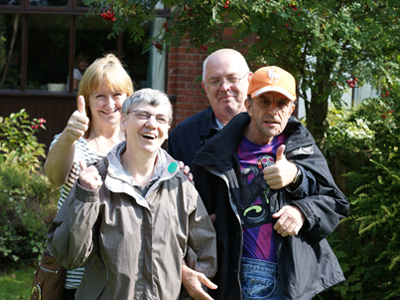
England’s Shared Lives schemes are helping disabled and older people live more fulfilled lives but their full potential is going untapped, according to a report by the UK’s network of Shared Lives schemes.
The report by Shared Lives Plus found that 9,660 people in England, some 7,710 of who had learning disabilities, were being helped by the approach, which sees families offer accommodation and support to adults with care needs.
It found that Shared Lives had helped more than 90% to make at least one new friend and enabled 30% to go on holiday for the first time. A further 26% joined a club not exclusively for disabled people for the first time in their lives and 12% found a boyfriend or girlfriend after getting support through Shared Lives.
However, the report found that the potential of the scheme to deliver savings and improve lives has yet to be fully exploited.
It said that if every local authority matched the level of Shared Lives use seen in Hampshire and Sheffield, it could deliver savings of up to £147m a year as well as reducing hospital admissions, delaying admissions to residential care and easing individuals’ reliance on community services.
But the report warned that 16% of Shared Lives schemes were at risk of being unsustainable because too few people were using them and called for “urgent” action to increase the use of Shared Lives in these areas.
Alex Fox, chief executive of Shared Lives Plus, said: “This study shows the potential for Shared Lives to transform not just the lives of individuals, but also to help transform our adult social care system by delivering major savings and improved benefits, at a time when an ageing population and falling budgets are presenting the NHS and local authorities with a uniquely difficult challenge.
“We’re concerned that a significant minority of schemes are not at a sustainable scale, because they have recruited too few Shared Lives carers and reach too few people.
“Investing in a local scheme has been shown to help people live better lives and to save a significant amount of money, so it should be a no brainer.”
In his foreword to the report care minister Norman Lamb called on local authorities to ramp up their use of Shared Lives.
“I would really urge those areas which lag behind in terms of the use of Shared Lives to recognise the enormous potential of this approach,” he wrote. “Just imagine the difference between existing in an institution and living with a family – living with people who care about you and who share their lives with you.”


 Bournemouth, Christchurch and Poole
Bournemouth, Christchurch and Poole  Hampshire County Council
Hampshire County Council  Lincolnshire County Council
Lincolnshire County Council  Norfolk County Council
Norfolk County Council  Northamptonshire Children’s Trust
Northamptonshire Children’s Trust  South Gloucestershire Council
South Gloucestershire Council  Wiltshire Council
Wiltshire Council  Wokingham Borough Council
Wokingham Borough Council  Children and young people with SEND are ‘valued and prioritised’ in Wiltshire, find inspectors
Children and young people with SEND are ‘valued and prioritised’ in Wiltshire, find inspectors  How specialist refugee teams benefit young people and social workers
How specialist refugee teams benefit young people and social workers  Podcast: returning to social work after becoming a first-time parent
Podcast: returning to social work after becoming a first-time parent  Podcast: would you work for an inadequate-rated service?
Podcast: would you work for an inadequate-rated service?  Family help: one local authority’s experience of the model
Family help: one local authority’s experience of the model  Workforce Insights – showcasing a selection of the sector’s top recruiters
Workforce Insights – showcasing a selection of the sector’s top recruiters 

 Facebook
Facebook X
X LinkedIn
LinkedIn Instagram
Instagram
i am a shared lives carer and on the whole it is a great way to support people,but in my area it would seem that shared lives carers are not being given details of a persons personal budget and are expected to do all the care even though by law a budget should be discussed and offered.i wonder how many authorities are offering personal budgets in this setting? or merely using shared lives as an unlawful way to save money